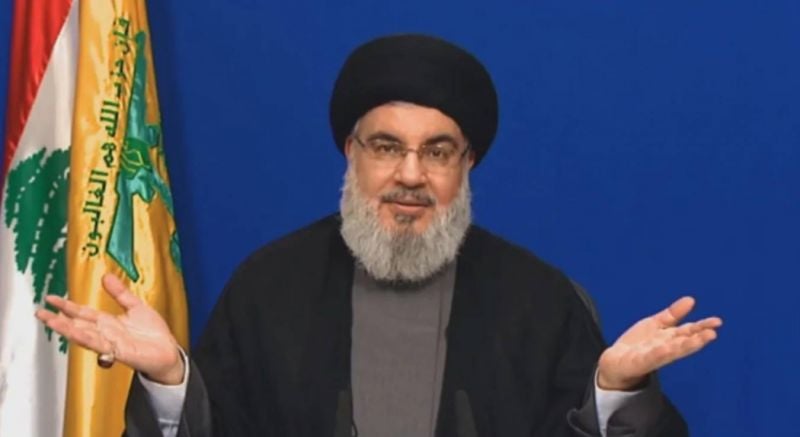
Hezbollah Secretary General Hassan Nasrallah giving a speech in May 2022. (Credit: AFP archive photo)
On July 16, 2006, six days after the outbreak of hostilities between Hezbollah and Israel, party leader Hassan Nasrallah delivered an incendiary speech that would be remembered in history.
“Behold the Israeli vessel sinking under resistance fire,” Nasrallah declared on al-Manar Television, as an Israeli warship, targeted by Hezbollah, was engulfed in flames off the coast of Beirut.
Fast forward to today, October 2023, the Israeli army continues its relentless assault on the Gaza Strip, and is also shelling southern Lebanon. The recent outbreak of conflict has tragically claimed the lives of civilians, journalists, and even Hezbollah fighters.
Nasrallah, however, remains conspicuously silent.
Hezbollah, Lebanon, and the entire region, stand on the brink of a potentially devastating war following Hamas’ surprise attack on Israel, but Nasrallah has yet to address the situation.
In April, the party leader fervently praised the “united fronts of resistance,” but now he seems to favor a more cautious approach, perhaps awaiting a clearer perspective before making his next move.
‘Keeping all his options open’
Hezbollah was swift to react to the violent developments unfolding in Gaza.
The day after Hamas’ offensive, Sheikh Hashem Safieddine, chairman of Hezbollah’s executive council — and presumed heir to Nasrallah — took to the stage and asserted that the party was not going to merely sit on the fence in this battle.
“Everything we have is at your disposal,” Safieddine stated in a message to Hamas.
The party has been involved in the conflict, albeit cautiously, launching occasional strikes on Israeli positions in the north but avoiding action that might trigger an all-out war.
The situation, best described as “neither war nor peace,” ultimately falls short of Nasrallah’s vision of the “resistance unity of fronts.”
Meanwhile, Israel has promised to eliminate Hamas and its counterattack has been marked with heightened violence.
“As things stand now, if Hassan Nasrallah were to address the situation and without announcing an escalation in his party’s response, there is a possibility that people would highlight his previous statements, suggesting a shift in his position,” Ali Amin, editor-in-chief of the daily al-Janoubiya and critic and expert on the party.
Declaring an all-out war however, will be no easy feat for Hezbollah.
Amid an economic and political crisis, the risk is too great, especially as the Israeli response is likely to be extremely violent. Politically, it could also cost the party dearly, especially considering they don’t seem to have the backing of their allies.
“Everyone in Lebanon wants to avoid an escalation,” Amin said.
In this context, a speech by Nasrallah, known for his oratory skills, would bring definitive answers for the Lebanese and Arab and Western stakeholders, anticipating his response.
Yet, it remains uncertain whether Nasrallah can or should address these expectations at this juncture, particularly amid the psychological warfare with Israel.
According to Nicholas Blandford, a nonresident senior fellow with the Atlantic Council’s Middle East Programs who covers security affairs of Lebanon and Syria, Nasrallah wants to keep all his options on the table.
Blandford believes that the party leader does not want to commit his group to escalation or de-escalation until he has a clearer picture of developments in Gaza.
According to a different reading, Hezbollah might be waiting for a green light from Tehran, which in turn, is reluctant to become enmeshed in a regional escalation with Tel Aviv backed by the United States.
“Iran does not necessarily want to compromise its presence in Lebanon by embarking on a risky war,” said Amin.
Last week, a meeting was held in Beirut between Nasrallah and Iran’s Foreign Minister, Hussein Amir-Abdollahian, who made sure to communicate Nasrallah's position to the press.
“Hassan Nasrallah informed me that all scenarios were on the table,” Amir-Abdollahian said in an interview with the pan-Arab al-Jazeera channel.
‘At the right moment’
Both Hezbollah and Iran say they are ready for escalation on Lebanon’s southern border, should Israel “cross red lines.”
While Gaza City may soon cease to exist, with more than 2,800 Palestinians killed by Israeli shells so far, a ground offensive in the coastal enclave seems to be the only red line that Tel Aviv has not — yet — crossed.
With the Israeli army poised for a potential ground invasion of Gaza, Iran, and consequently Nasrallah, may find themselves forced to break free from their political inertia.
According to local media reports, Nasrallah might deliver a speech this week. L’Orient-Le Jour tried reaching out to Hezbollah spokespeople but to no avail.
“Nasrallah will only address the situation at the right moment,” said Kassem Kassir, an analyst close to Hezbollah. “This is when he would declare the start of the war, or the end of it.”
This article was originally published in French in L'Orient-Le Jour. Translation by Sahar Ghoussoub.